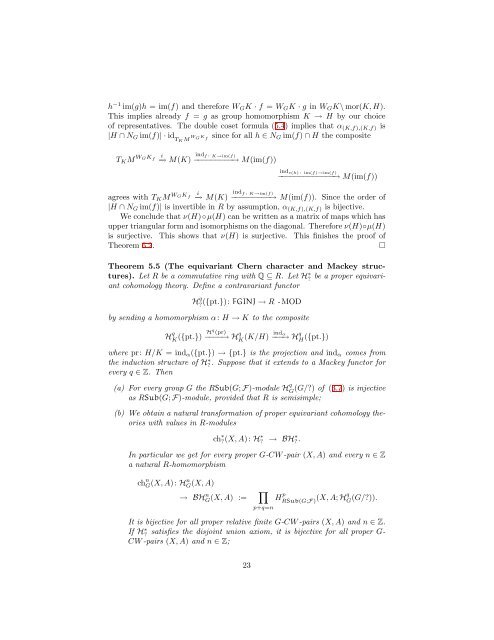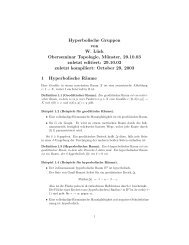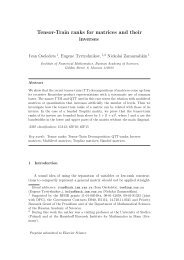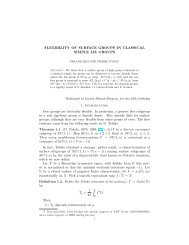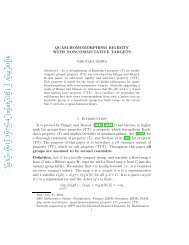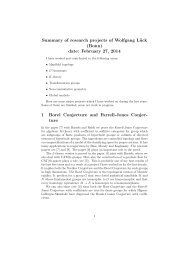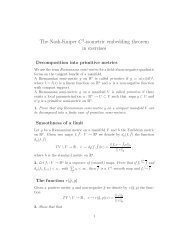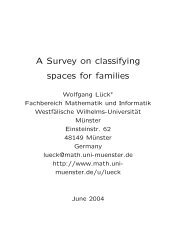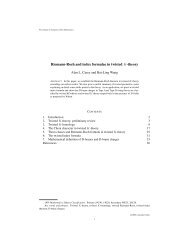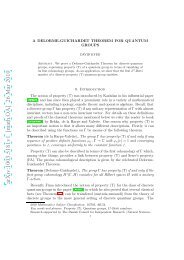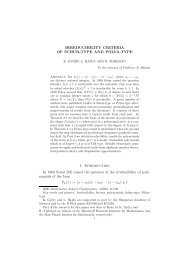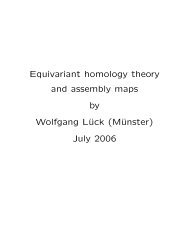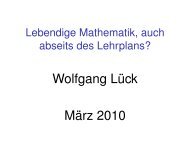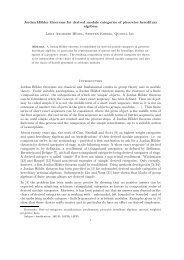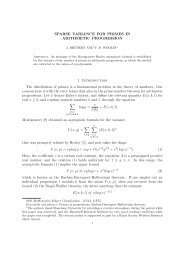Equivariant Cohomological Chern Characters
Equivariant Cohomological Chern Characters
Equivariant Cohomological Chern Characters
You also want an ePaper? Increase the reach of your titles
YUMPU automatically turns print PDFs into web optimized ePapers that Google loves.
h −1 im(g)h = im(f) and therefore W G K · f = W G K · g in W G K\ mor(K, H).This implies already f = g as group homomorphism K → H by our choiceof representatives. The double coset formula (5.4) implies that α (K,f),(K,f) is|H ∩ N G im(f)| · id TK M W G K fsince for all h ∈ N G im(f) ∩ H the compositeT K M W GK fi−→ M(K) ind f : K→im(f)−−−−−−−−−→ M(im(f))iind c(h) : im(f)→im(f)−−−−−−−−−−−−−→ M(im(f))agrees with T K M W GK f−→ M(K) ind f : K→im(f)−−−−−−−−−→ M(im(f)). Since the order of|H ∩ N G im(f)| is invertible in R by assumption, α (K,f),(K,f) is bijective.We conclude that ν(H)◦µ(H) can be written as a matrix of maps which hasupper triangular form and isomorphisms on the diagonal. Therefore ν(H)◦µ(H)is surjective. This shows that ν(H) is surjective. This finishes the proof ofTheorem 5.2.Theorem 5.5 (The equivariant <strong>Chern</strong> character and Mackey structures).Let R be a commutative ring with Q ⊆ R. Let H? ∗ be a proper equivariantcohomology theory. Define a contravariant functorH q ?({pt.}): FGINJ → R - MODby sending a homomorphism α: H → K to the compositeH q K ({pt.}) Hq (pr)−−−−→ H q indαK(K/H) −−−→ H q H ({pt.})where pr: H/K = ind α ({pt.}) → {pt.} is the projection and ind α comes fromthe induction structure of H? ∗ . Suppose that it extends to a Mackey functor forevery q ∈ Z. Then(a) For every group G the RSub(G; F)-module H q G(G/?) of (3.7) is injectiveas RSub(G; F)-module, provided that R is semisimple;(b) We obtain a natural transformation of proper equivariant cohomology theorieswith values in R-modulesch ∗ ?(X, A): H ∗ ? → BH ∗ ?.In particular we get for every proper G-CW -pair (X, A) and every n ∈ Za natural R-homomorphismch n G(X, A): H n G(X, A)→ BH n G(X, A) :=∏p+q=nH p RSub(G;F) (X, A; Hq G (G/?)).It is bijective for all proper relative finite G-CW -pairs (X, A) and n ∈ Z.If H? ∗ satisfies the disjoint union axiom, it is bijective for all proper G-CW -pairs (X, A) and n ∈ Z;23


